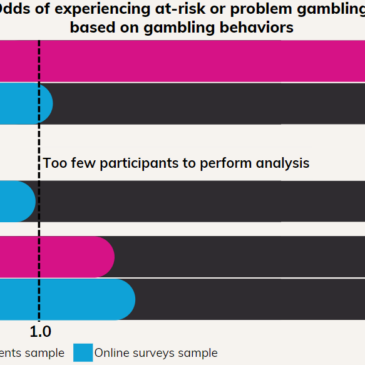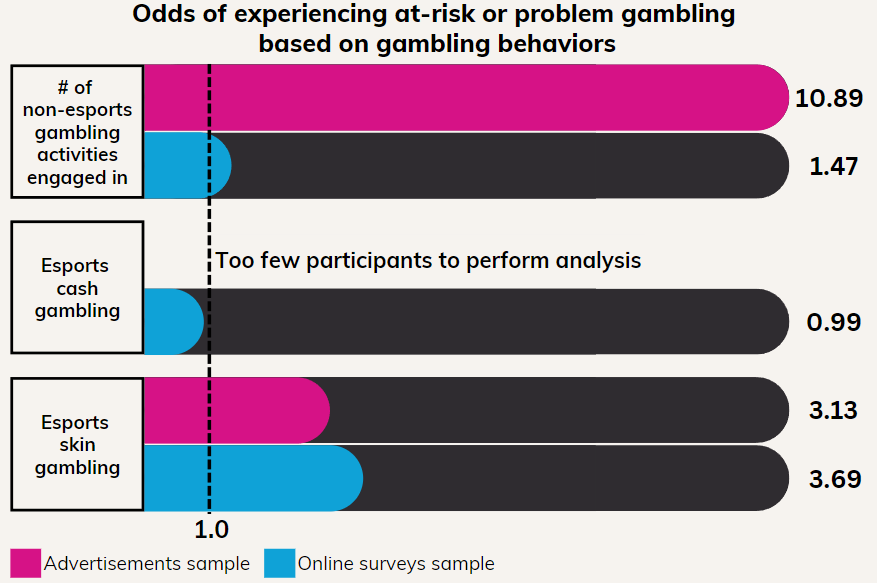Over the previous years, game design studios and gambling operators have increasingly blurred the lines between gambling and gaming. One such way this manifests is through esports. Esports–the competitive playing of video games–attract a relatively young audience who sometimes gamble on game outcomes, either with real money or virtual skins. Being introduced to this form of gambling at a young age could have harmful effects. This week, The WAGER reviews a study by Nerilee Hing and colleagues that examined the relationships between esports betting and problem gambling.
What were the research questions?
What are the characteristics of adolescent esports gamblers? How does betting on esports, with cash and/or virtual skins, relate to at-risk/problem gambling?
What did the researchers do?
The researchers surveyed two groups of Australian adolescents—841 recruited from advertisements and 826 from online surveys—to record their gambling and gaming habits, as well as measures for problem gambling, impulsivity, and general well-being. Next, they ran a series of regression analyses that used participants’ gaming, gambling, demographic and psychological characteristics to predict their past-month esports skin and cash betting. Finally, the researchers examined the relationship between participation in esports cash or skin betting, other kinds of gambling, and problem gambling symptoms using multiple regression analyses. A number of key variables, including the rate of problem gambling, differed between the two samples, so the researchers performed separate analyses for each sample.
What did they find?
Few demographic and psychological variables predicted esports cash or skin gambling consistently between the two samples. For example, in the advertisements sample but not the online surveys sample, teens who scored high in impulsivity were more likely to have engaged in past-month esports cash gambling. Overall, participants’ gaming activities better predicted their esports cash and skin betting than their demographic characteristics. In particular, for both samples, participation in other forms of gambling–like fantasy sports and the lottery–consistently predicted both esports cash and skin betting. Finally, teens who were highly involved in non-esports gambling activities and esports skin betting were more likely to report at-risk/problem gambling than their counterparts, but this relationship was not supported for esports cash betting (see Figure).
Figure. Odds ratios for experiencing at-risk or problem gambling based on each predictor. Odds ratios can be interpreted as being X times more likely to report the outcome. For example, in both samples in this study, people who gamble on esports using virtual skins as their currency were over three times more likely to report at-risk or problem gambling compared to those who did not gamble on esports using virtual skins. The odds ratio for esports cash gambling in the online sample did not reach statistical significance. Click image to enlarge.
Why do these findings matter?
These findings are important for two main reasons. First, these results could inform public policymakers by showing that—while it is not currently recognized as gambling—unregulated skin gambling can potentially present substantial risks to adolescents. Future research could further examine these risks specific to esports gambling among adolescents and emerging adults to help test, develop, and refine public health messaging. Second, these results can help guide gaming industry stakeholders who have taken action against unregulated gambling, like Twitch, to better target their efforts to maximize their public health impact.
Every study has limitations. What are the limitations in this study?
Because the study employed two separate samples that were analyzed separately and had small sample sizes for certain subgroups, some analyses were underpowered and might not be generalizable to the general public. Additionally, this study used convenience sampling which may have further limited the generalizability of results.
For more information:
Individuals in the U.S. who are concerned about their gambling may find state resources through the National Council on Problem Gambling. SAMHSA also offers a 24-hour national helpline for mental health concerns, including problem gambling. Others may find help on our Addiction Resources page.
— John Slabczynski
What do you think? Please use the comment link below to provide feedback on this article.





